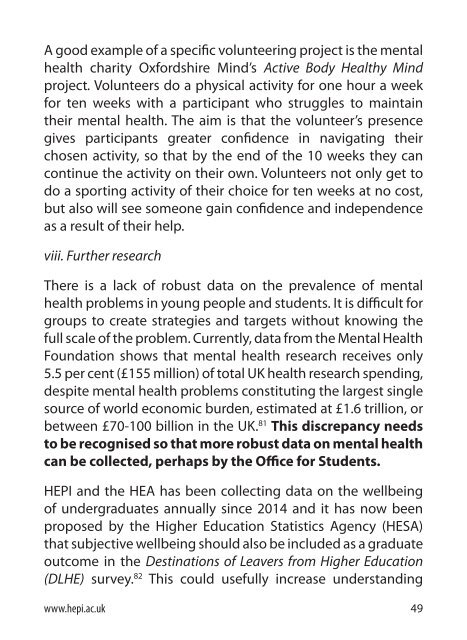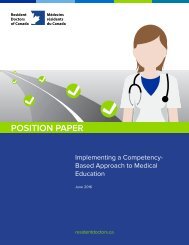The invisible problem? Improving students’ mental health
2cU9ATf
2cU9ATf
You also want an ePaper? Increase the reach of your titles
YUMPU automatically turns print PDFs into web optimized ePapers that Google loves.
A good example of a specific volunteering project is the <strong>mental</strong><br />
<strong>health</strong> charity Oxfordshire Mind’s Active Body Healthy Mind<br />
project. Volunteers do a physical activity for one hour a week<br />
for ten weeks with a participant who struggles to maintain<br />
their <strong>mental</strong> <strong>health</strong>. <strong>The</strong> aim is that the volunteer’s presence<br />
gives participants greater confidence in navigating their<br />
chosen activity, so that by the end of the 10 weeks they can<br />
continue the activity on their own. Volunteers not only get to<br />
do a sporting activity of their choice for ten weeks at no cost,<br />
but also will see someone gain confidence and independence<br />
as a result of their help.<br />
viii. Further research<br />
<strong>The</strong>re is a lack of robust data on the prevalence of <strong>mental</strong><br />
<strong>health</strong> <strong>problem</strong>s in young people and students. It is difficult for<br />
groups to create strategies and targets without knowing the<br />
full scale of the <strong>problem</strong>. Currently, data from the Mental Health<br />
Foundation shows that <strong>mental</strong> <strong>health</strong> research receives only<br />
5.5 per cent (£155 million) of total UK <strong>health</strong> research spending,<br />
despite <strong>mental</strong> <strong>health</strong> <strong>problem</strong>s constituting the largest single<br />
source of world economic burden, estimated at £1.6 trillion, or<br />
between £70-100 billion in the UK. 81 This discrepancy needs<br />
to be recognised so that more robust data on <strong>mental</strong> <strong>health</strong><br />
can be collected, perhaps by the Office for Students.<br />
HEPI and the HEA has been collecting data on the wellbeing<br />
of undergraduates annually since 2014 and it has now been<br />
proposed by the Higher Education Statistics Agency (HESA)<br />
that subjective wellbeing should also be included as a graduate<br />
outcome in the Destinations of Leavers from Higher Education<br />
(DLHE) survey. 82 This could usefully increase understanding<br />
www.hepi.ac.uk 49





